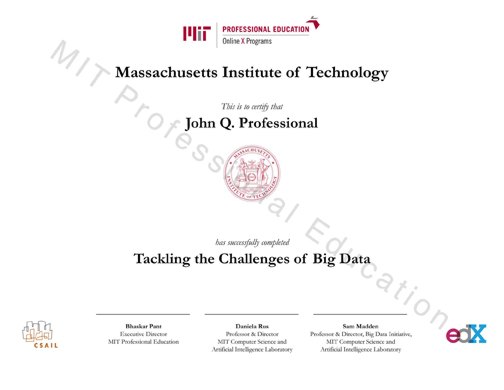| MIT Professional Education MOOC on Big Data |
| Written by Sue Gee |
| Friday, 10 January 2014 |
|
CSAIL Researchers are lined up to teach a MOOC with a difference on the edX platform. The difference is that Online X courses, offered through MIT Professional Education, will charge a fee to all participants. Until now all edX courses have been available free of charge. In the case of courses such as CS50 which offers a certificate to paying students it has provided the alternative of "auditing" the course, an option whereby you have complete access to all the course materials, and of obtaining an Honor Code Certificate by successfully completing it.
Now MIT Professional Education has announced a new line of professional programs called Online X Programs with courses that: will provide companies and organizations the ability to offer training and education to their employees on a topic that confronts most industries today. Payment from individuals who will be collected on enrollment while groups of 15 or more students can be invoiced. The fee for first course, Tackling the Challenges of Big Data is $495. It runs from March 4 - April 4 and will consist of five modules covering 18 topic areas in 20 hours of video plus case studies. Students who complete five assessments, designed to reinforce key learning concepts of each module, with an average of 80% will be awarded a certificate of completion.
This first Online X course is intended for "early career professionals" and "senior technical managers" and its prerequisite is a bachelor's level education in computer science. According to its course description, Tackling the Challenges of Big Data: will survey state-of-the-art topics in Big Data, looking at data collection (smartphones, sensors, the Web), data storage and processing (scalable relational databases, Hadoop, Spark, etc.), extracting structured data from unstructured data, systems issues (exploiting multicore, security), analytics (machine learning, data compression, efficient algorithms), visualization, and a range of applications. A full course outline can be found on its web page. More information is given in this video by its main instructors, Sam Madden and Daniela Rus both of whom are professors of Electrical Engineering Computer System at MIT's Computer Science and Artificial Intelligence Laboratory (CSAIL).
Ten other MIT professors have been recruited as additional faculty instructors providing a background of wide experience and expertise for the course. In its recent initiative to introduce paid-for enrollment Udacity also chose big data as the first topic to have the new option. Udacity, however, continues to make the course content freely available, while students who subscribe to the courses receive additional support by way of a personal coach. Will paid-for MOOCs prove as popular as the free ones? Probably not. But it is likely that they will have higher success rates in terms of the ratio of students completing the course and earning a certificate. Interestingly the Online X Programs website doesn't use the term MOOC relying instead on its MIT Professional Education affiliation and its focus on "professionals" as its target audience to distinguish this offering from others on the edX platform.
More InformationTackling the Challenges of Big Data Related ArticlesComputer Science MOOCs For The New Year Udacity Introducing Big Data Courses and Paid Enrollment
To be informed about new articles on I Programmer, install the I Programmer Toolbar, subscribe to the RSS feed, follow us on, Twitter, Facebook, Google+ or Linkedin, or sign up for our weekly newsletter.
Comments
or email your comment to: comments@i-programmer.info
|
| Last Updated ( Friday, 10 January 2014 ) |





